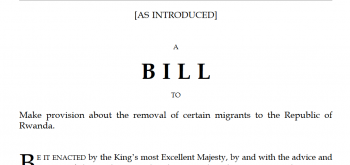The 10-year-old daughter of an asylum seeker from Bahrain might be deported back to her home country where she will be at risk of female genital mutilation (FGM). The family division of the high court ruled that it has no power to stop her deportation.
The mother, a Bahrain citizen originally from Sudan, had expressed fears that Bahrain authorities could force them to return to her origin country. The mother herself was subject to FGM as a child in Sudan and claims her two sisters died as a result of the same practice.
The family arrived in the UK in 2012 and their asylum claim was refused in 2015. Social services and the National FGM Centre argue that the girl is at high risk of FGM if deported. Social services applied to the high court for a FGM protection order to stop the Home Office from removing the girl. The order was initially granted by the court, but it was later challenged by the home secretary. The president of the family court then accepted that it has no power to stop the government from deporting the girl even if it believes there is a high risk of FGM.
Writing for the Guardian, Charlotte Proudman, the lawyer who represented the girl’s mother, wrote that the government was ‘more concerned with its vote-oriented commitment to reduce immigration rather than to enforce the UK’s international law to promote and protect the welfare of vulnerable girls’. ‘In doing so, it exposes a glaring double standard,’ Proudman continues. ‘On the one hand it postures about its commitment to prosecute minority ethnic parents in the UK over FGM, yet on the other hand it deports women and girls at risk of mutilation abroad.’
The deportation seems to be at odds with the UK government’s stated mission to end FGM accross Africa by 2030. The government pledged £50m to the cause last year, claiming it was the single biggest investment to tackle the issue by an international donor. Almost a third of the money would be allocated to Sudan, where about 87% of women aged between 15 and 49 have been victims of FGM, according to the World Health Organization.
Although FGM is a recognised ground for asylum in Britain, the Home Office has previously argued that the risk in similar cases was low.







